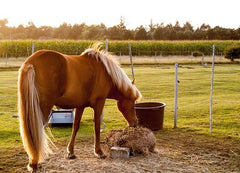
Why Continuous Supplementation?
When compared to other nutrients required for horses, vitamins and minerals are needed in quite small amounts. However, they are absolutely essential for normal bodily functions. These crucial classes of nutrients need to be consumed on a daily basis in order to ensure your horse's best health. The essential macro-minerals are calcium, phosphorus, magnesium, sodium, chloride, potassium, and sulfur. The essential trace minerals are iron, zinc, copper, selenium, manganese, iodine, and cobalt. Differentiation between the two classes of minerals is determined by the amount necessary to the horse. Macro-minerals are typically measured in percentage of diet or grams per kilogram, while trace minerals are typically measured in parts per million of the diet or milligrams per kilogram. No matter which vitamin or mineral we are discussing, it is crucial that it be fed within the recommended range for optimal health.
Vitamin & Minerals
Certain vitamins and minerals are consistently deficient in feedstuffs and need to be provided by a supplement in order to ensure your horse's requirements are being met. One mineral in particular that is normally lacking in feedstuffs is zinc. Zinc deficiency is probably one of the most widespread and most overlooked deficiencies of horses in the United States. Normal diets only supply three-fifths of the minimum recommendation of the National Research Council. Zinc serves as an antioxidant and is critical for skin and hoof health, carbohydrate metabolism, and thyroid production. Without supplementation, your horse may experience weak, brittle hooves and have a difficult time putting on or holding weight. Providing supplementation will help ensure that your horse isn't one of the many horses across the United States that isn't provided enough zinc from their common feedstuffs. Other vitamins and minerals can vary greatly in feedstuffs.
Weather Conditions and Soils
Weather conditions and soils in certain areas of the United States can greatly impact the levels of certain vitamins and minerals. The Northwest, for example, is extremely selenium deficient. If you are not providing your horse with selenium supplementation while living in or feeding forage from this area, he is almost definitely selenium deficient. Removing supplementation from your horse for only one month will most likely make him subclinically deficient, and after 4 months of no supplementation on Northwest forages, he will have substantially lower selenium levels. Research has found that horses not supplemented for 4 months will in fact be so deficient that supplementation with 3 mg of organic selenium will not increase their blood levels to adequate levels after 4 months. It is predicted that supplementation would need to be provided for 6 to 8 months before blood levels would be back to adequate ranges.
While many horse owners only supplement while practicing and competing on their horses, research provides that it is essential for your horse's health to continuously supplement.
Vitamin E & Storing Hay
Storing hay also greatly impacts the nutritional value. While the nutritional content of hay's protein and minerals will stay pretty stable, vitamins are much more volatile. The volatility of vitamins allows for dramatic decreases during harvest and storage. For example, vitamin C is high in green grass; however, when cut and baled, it can lose up to 50% in the first 24 hours of curing. Vitamin E is also abundant is green grass; again, however, the vitamin E content continuously decreases once baled. Research has shown that hay stored for 6 months loses 80% of its vitamin E due to oxidation, rendering it useless to your horse. The loss of volatile vitamins makes it crucial that your horse is receiving a supplement in order to keep meeting its nutritional requirements throughout the year.

While subclinical deficiencies aren't visible to the naked eye, they can wreak havoc on your horse. These deficiencies can not only cause your horse to lose his competitive edge but also to be more susceptible to disease and infection and can have long-term effects that shorten his competitive life, as well as his total life span. Supplementing your horse with a great vitamin and mineral supplement for horses in your area will address these possible deficiencies. Do the best thing for your horse by keeping vitamin and mineral levels adequate in your horse throughout the year. In turn, your horse will be able to give his best to you.






Leave a comment (all fields required)